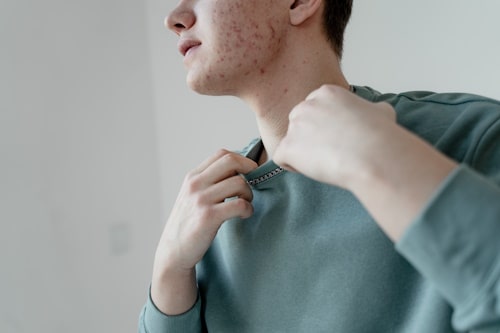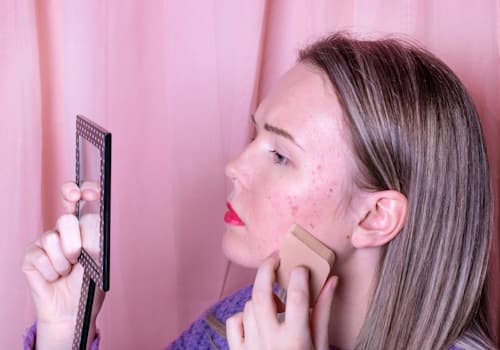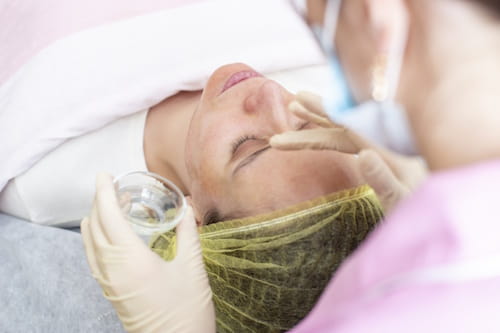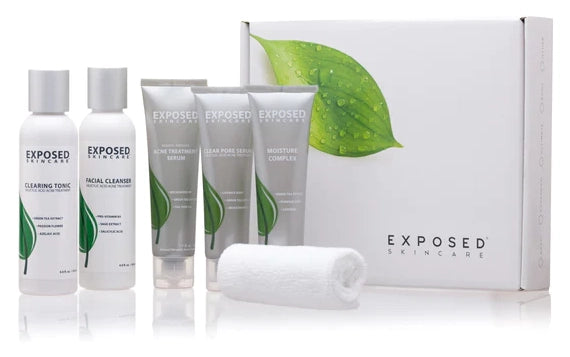Acne is a skin condition that nearly everyone encounters at some point in their life. Understanding it is crucial for effective treatment and long-lasting results.
This comprehensive guide will answer the question, "What are acne blemishes?" and dive into the types, causes, and treatment options available for this common skin condition. So, let's embark on a journey that takes us beneath the surface of your skin to explore acne's complex world.
Also read: How to choose the best acne treatment
Biggest Take-Aways:
- Acne is a complex condition with various types and causes, affecting people differently.
- Treatment options for acne are diverse and may require a personalized approach based on your skin type and the severity of your acne.
- Neglected acne can sometimes lead to more serious skin conditions, making effective management crucial.
- Exposed Skin Care offers a comprehensive range of products that can treat various types of acne effectively, making it a versatile option for acne management.

What Are Acne Blemishes? An In-Depth Look
Acne blemishes are the visible signs of acne, appearing as various types of bumps on the skin. While many people use the terms "acne" and "blemish" interchangeably, a blemish is any type of mark, discoloration, or flaw that appears on the skin.
Acne is a specific type of blemish characterized by its origin and potential to worsen if not treated properly.
Types of Acne Blemishes
Different types of acne blemishes exist, and understanding the variety can guide you in determining the most effective treatment options.
- Blackheads: These are open clogs filled with oil and dead skin cells, appearing as small, dark spots.
- Whiteheads: Similar to blackheads, but closed off and appear as small, white bumps.
- Papules: Red, inflamed bumps on the skin that are often tender to the touch.
- Pustules: Also known as a pustule, these are similar to papules but contain pus.
- Nodules: Larger, solid, and painful lumps deep within the skin.
- Cysts: Severe form of acne. These are painful, pus-filled lumps deep under the skin.
Contributing Factors to Acne Blemishes
- Hormonal Changes: Often a significant cause of acne, especially during puberty and pregnancy.
- Dead Skin Cells: These can accumulate and clog pores, making an ideal environment for acne.
- Excess Oil Production: Too much oil can mix with dead skin cells and clog pores, contributing to acne.

- Bacteria: Certain types of bacteria can infiltrate clogged pores and cause acne.
Severity Levels
- Mild Acne: Mostly composed of blackheads and whiteheads.
- Moderate Acne: Includes several types like papules and pustules.
- Severe Acne: Includes nodules and cysts and requires different treatment options.
Understanding the Anatomy of Acne
To fully grasp what acne blemishes are, it's crucial to understand the skin structure and how acne forms.
The Pore Structure
The skin's surface contains countless pores connected to a hair follicle. Within these follicles, oil and dead skin cells can accumulate and form a clog, creating the environment for different types of acne to appear.
Hormonal Impact
Hormonal changes, such as those during puberty or pregnancy, can exacerbate oil production. This is particularly important because acne is a common skin condition across all age groups, including adults.
External Factors
Things like diet, stress, and environmental irritants can make acne worse. Therefore, it's essential to consider these variables to clear your acne.

Common Misconceptions About Acne
Many myths surround this common skin condition, and debunking them is vital for effective treatment.
- Acne Is Caused By Poor Hygiene: Acne is an inflammatory condition and not solely the result of dirty skin.
- Sun Exposure Clears Acne: While sunlight may temporarily dry out pimples, it can also irritate your skin and worsen acne in the long run.
- Frequent Washing Helps: Overwashing can worsen acne by disrupting the natural oil balance.
Acne Treatment: What Works and What Doesn’t
Knowing how to treat acne is crucial. Several treatment options are available, each catering to the specific type of acne blemish you might have.
Topical Applications
- Over-the-counter treatments: These include lotions and gels that often contain benzoyl peroxide or salicylic acid.
- Prescription Medications: These are stronger and are often retinoid-based.
Oral Medications
- Antibiotics: Aimed at reducing inflammation and bacteria.
- Hormone Therapy: Used mainly for women experiencing hormonal acne.
Cosmetic Procedures
- Chemical Peels: Effective for acne scars and dark spots.

- Microdermabrasion: This method uses tiny exfoliating crystals to remove the surface layer of skin.
Mechanical Treatments
- Exfoliation: Helps remove a layer of skin and can clear clogged pores.
- Light Therapy: Targets bacteria and reduces inflammation.
Natural Remedies
- Tea Tree Oil: Known for its antibacterial properties.
- Green Tea Extract: Anti-inflammatory and can reduce oil production.
When to Start Treatment
The best time to start treatment is at the first sign of acne. Early intervention can prevent moderate to severe acne and reduce the risk of scarring.
Acne Through The Ages
Acne is not limited to teenagers. Adult acne is more common than you might think and can persist well into your 30s, 40s, or even 50s.
- Teen Acne: This is typically due to hormonal changes and increased oil production. Acne typically appears on the face, chest, and back.
- Adult Acne: This can be more complicated, involving factors like stress, medications, and even certain types of skin products. For adults, acne can appear on the lower part of the face, including the chin and jawline.
Having acne doesn't mean you're doomed to a life of discomfort and low self-esteem. The key is to understand the many types of acne and treatment options available, then take proactive steps to manage your symptoms.
While acne is a common skin condition, it doesn't have to be a lifelong burden. With the right approach, you can experience clearer, healthier skin free from the clutches of bothersome blemishes.
Benefits of Using Exposed Skin Care for Acne Management
Exposed Skin Care stands out for its comprehensive approach to tackling cystic acne and other types of acne. Whether you experience acne due to hormonal changes or genetics, this product line is designed to cater to various skin types.
Why choose Exposed Skin Care?
- Comprehensive Kits: Offers a range of products like cleansers, tonics, and serums that dive deeper into the skin to tackle acne at its root.
- Addresses Various Acne Types: From acne pimples and red spots to more severe forms like nodulocystic acne and acne cysts, Exposed Skin Care has solutions for you.
- Safe for All Skin Types: Whether you have oily, dry, or combination skin, these products are formulated to suit your skin type, reducing the risk of worsening your acne.
- Natural Ingredients: Incorporates natural extracts that soothe the surrounding skin and can even address issues like fungal acne.
- Probiotic Complex: Harmonizes the gut flora, which is a lesser-known but significant factor that acne affects.
The range also provides specialized treatments for specific conditions, such as acne conglobata, a severe skin condition that occurs when acne lesions cluster together. Acne can persist, but with Exposed Skin Care, blemishes caused by acne may be a thing of the past.
Conclusion
Understanding the complexity of acne is the first step toward effective management. From hormonal imbalances to clogged pores, acne causes are diverse and can manifest differently from one person to another.
People with acne often grapple with various types of blemishes, from the standard pink bumps on the skin to more severe forms that may require specialized acne medication. While some individuals may experience light forms of acne that can be managed with over-the-counter solutions, others might deal with nodules, cysts, or even severe acne types.
Severe acne may sometimes lead to secondary issues, affecting broader skin areas and posing scarring or hyperpigmentation risks. Products like Exposed Skin Care can be beneficial in treating a wide range of acne symptoms.
Blemishes can sometimes be more than just a cosmetic concern. For example, although rare, some skin conditions can escalate into more severe issues like skin cancer if left untreated. Therefore, taking proactive steps for effective acne management is always prudent.
As we’ve discussed, acne is a multi-faceted skin condition requiring a well-rounded treatment approach. Although the landscape of acne management can be complicated, it’s heartening to know that various treatment options are available to help you lead an acne-free life.
FAQs
What Are Acne Blemishes?
Acne blemishes are inflamed or non-inflamed lesions on the skin caused by clogged pores, excess oil, and dead skin cells. They come in several forms like blackheads, whiteheads, and pimples.
What Causes Acne?
A combination of factors such as hormonal changes, excess oil production, and clogged pores causes acne.
Are All Types of Acne the Same?
No, many types of acne range from mild forms like whiteheads and blackheads to severe types like nodules and cysts.
How Can I Treat Acne?
Treatment varies based on the type of acne you have. Options include over-the-counter creams, prescription medications, and specialized skincare products.
Is Acne a Sign of Skin Cancer?
While acne is not a sign of skin cancer, unexplained changes in your skin should be monitored for any potential issues.
What is Exposed Skin Care?
Exposed Skin Care is a line of skincare products designed to treat a wide range of acne symptoms, suitable for all skin types and addressing various forms of acne.


















